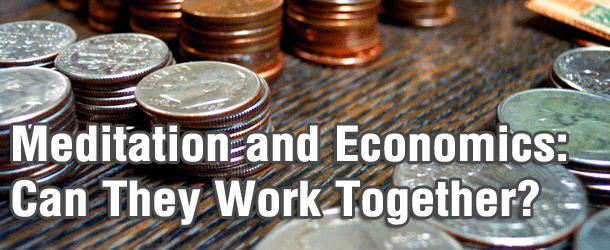
As the saying goes, “Money makes the world go ‘round.” Whether you believe this to be true or not, I think we’d all agree that money plays a fundamental role in our lives. In this article, I’ll explore the financial benefits of meditation.
A Short (Very Short) Economic Lesson
There are two ways to generate money. One way is to earn it. You do this through work (and if you’re like most in this country, you do lots of that). The other way is to save what you have without spending it. For instance, imagine that you’re buying a car. You may shop around to get the best deal. One dealer has a car for one price, while another sells the same car for $1,000 less. If you bought the car that sold for less, you’d save $1,000, which is similar to earning an extra $1,000.
When your mind is less cluttered, you make room for creativity to flourish. In this country, the entrepreneurial spirit reigns. Many of our nation’s greatest self-starters succeeded by creating something that didn’t exist before.
Where did the inspiration for the greatest discoveries in science, technical inventions, and masterpieces in literature, music, and art come from? From the deepest part of our being, no doubt. But if your chattering mind is drowning out the inspiration, you won’t hear it. Quieting your mind allows for creative solutions—and genius—to emerge, which can result in an idea that can provide you a financial return.
Meditation as Means to Spend Less
Science has made it very clear that stress is a major cause of illness. Not every disease is linked to stress but many are. And more and more studies are showing that meditation reduces stress. If you meditate consistently, you are less stressed, which also means that you’re healthier. In my case, I’ve been meditating for years, and I’ve only missed one workday in my 25 year career—and that was a result of food poisoning. Of course, this is anecdotal evidence, but it’s made me a believer in the health benefits of meditation.
Daily life takes a toll on you body. Allow me to provide an analogy. If you were a cars, some of us are Fords while others are Toyotas. In this example, consider your “make” as your genetic predisposition. Let’s say that you’re a Toyota. You drive yourself hard: you slam on your brakes and never take care of routine maintenance, such as oil changes. Even though your Toyota-genes make you a reliable source of transportation, your neglect causes your transmission to go out. If you’re a Ford, the same amount of abuse may cause a completely different set of problems. For instance, your brakes and suspension may need to be changed.
Meditation is the routine maintenance that allows your body to run smoothly. Of course it’s no guarantee of good health, but a regular practice decreases the wear and tear that you put your bodies through when you’re consumed with stress and anxiety.
From a healthcare perspective, the less you’re sick, the less you’ll pay in medical bills. If you’re self-employed this is particularly important because of rising health care costs. In addition, when you’re out-of-commission because of illness, you’re not generating income. Even if you have great insurance coverage, more and more companies are rewarding their plan participants for not using sick days. If you’re able to stave off sickness, you’ll actually be rewarded with a check.
Reducing illness has greater benefits as well. Companies are finding it harder and harder to cover their employees. Meanwhile, government-funded insurance programs are facing budget shortfalls, if more of us reduced stress-related illnesses, everyone would benefit. So meditation can literally improve the economies of entire communities and nations.
Trade industries and corporate America are recognizing the importance of meditation too. I regularly speak in conference settings and share about the benefits of meditation. These large organizations realize that cutting healthcare costs will improve their bottom lines. In addition, they understand that healthier employees are more productive and less expensive to take care of.
Even if it’s just for a few minutes in the morning and before you go to sleep, take time to meditate. During that short period of time, you’re giving your mind a break. Imagine if you weren’t allowed to take a work break and had to stay on the job for 8-hours straight. Work would probably become dreadful and even hazardous to your health. Similarly, your mind is filled with thoughts all day. So give it a break and experience peace of mind.
Meditation is no panacea. And it probably won’t make you rich. You’ll still face stress, your body will still age, and you’ll still have bills to pay. But with regular practice, you’ll experience less stress, less wear and tear on your body, and as a result, your life will be richer.
– Dr. Robert Puff
Dr. Robert Puff, Ph.D. is a clinical psychologist, author, international speaker, and meditation expert who has been counseling individuals, families, nonprofits, and businesses for over twenty years. A contributing writer to Psychology Today, he has authored numerous books and creates a weekly podcast on happiness at http://www.HappinessPodcast.org He also creates a weekly podcast on meditation, http://www.MeditationForHealthPodcast.com and a weekly podcast on spiritual enlightenment, http://www.EnlightenmentPodcast.com
His retreat schedules can be found at http://www.HolisticRetreats.tv You also might find his blog useful at http://www.Meditation-Enlightenment.com
If you are interested in having Dr. Puff speak to your organization or company, you can learn more about his speaking services at http://www.SuccessBeyondYourImagination.com

